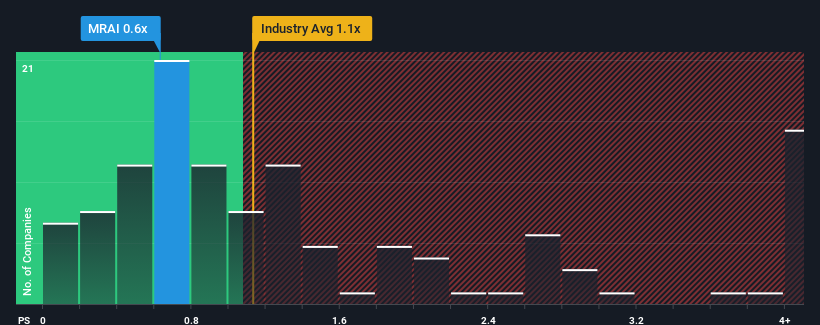- United States
- /
- Insurance
- /
- OTCPK:MRAI
Revenues Not Telling The Story For Marpai, Inc. (NASDAQ:MRAI) After Shares Rise 30%

Marpai, Inc. (NASDAQ:MRAI) shares have continued their recent momentum with a 30% gain in the last month alone. Not all shareholders will be feeling jubilant, since the share price is still down a very disappointing 34% in the last twelve months.
Even after such a large jump in price, you could still be forgiven for feeling indifferent about Marpai's P/S ratio of 0.6x, since the median price-to-sales (or "P/S") ratio for the Insurance industry in the United States is also close to 1.1x. Although, it's not wise to simply ignore the P/S without explanation as investors may be disregarding a distinct opportunity or a costly mistake.
See our latest analysis for Marpai

What Does Marpai's P/S Mean For Shareholders?
With revenue growth that's superior to most other companies of late, Marpai has been doing relatively well. Perhaps the market is expecting this level of performance to taper off, keeping the P/S from soaring. If you like the company, you'd be hoping this isn't the case so that you could potentially pick up some stock while it's not quite in favour.
If you'd like to see what analysts are forecasting going forward, you should check out our free report on Marpai.What Are Revenue Growth Metrics Telling Us About The P/S?
There's an inherent assumption that a company should be matching the industry for P/S ratios like Marpai's to be considered reasonable.
Taking a look back first, we see that the company grew revenue by an impressive 53% last year. Although, its longer-term performance hasn't been as strong with three-year revenue growth being relatively non-existent overall. Therefore, it's fair to say that revenue growth has been inconsistent recently for the company.
Shifting to the future, estimates from the one analyst covering the company suggest revenue should grow by 3.7% over the next year. Meanwhile, the rest of the industry is forecast to expand by 6.9%, which is noticeably more attractive.
In light of this, it's curious that Marpai's P/S sits in line with the majority of other companies. Apparently many investors in the company are less bearish than analysts indicate and aren't willing to let go of their stock right now. Maintaining these prices will be difficult to achieve as this level of revenue growth is likely to weigh down the shares eventually.
The Final Word
Marpai's stock has a lot of momentum behind it lately, which has brought its P/S level with the rest of the industry. Using the price-to-sales ratio alone to determine if you should sell your stock isn't sensible, however it can be a practical guide to the company's future prospects.
Given that Marpai's revenue growth projections are relatively subdued in comparison to the wider industry, it comes as a surprise to see it trading at its current P/S ratio. At present, we aren't confident in the P/S as the predicted future revenues aren't likely to support a more positive sentiment for long. A positive change is needed in order to justify the current price-to-sales ratio.
You should always think about risks. Case in point, we've spotted 5 warning signs for Marpai you should be aware of, and 3 of them are potentially serious.
If companies with solid past earnings growth is up your alley, you may wish to see this free collection of other companies with strong earnings growth and low P/E ratios.
New: Manage All Your Stock Portfolios in One Place
We've created the ultimate portfolio companion for stock investors, and it's free.
• Connect an unlimited number of Portfolios and see your total in one currency
• Be alerted to new Warning Signs or Risks via email or mobile
• Track the Fair Value of your stocks
Have feedback on this article? Concerned about the content? Get in touch with us directly. Alternatively, email editorial-team (at) simplywallst.com.
This article by Simply Wall St is general in nature. We provide commentary based on historical data and analyst forecasts only using an unbiased methodology and our articles are not intended to be financial advice. It does not constitute a recommendation to buy or sell any stock, and does not take account of your objectives, or your financial situation. We aim to bring you long-term focused analysis driven by fundamental data. Note that our analysis may not factor in the latest price-sensitive company announcements or qualitative material. Simply Wall St has no position in any stocks mentioned.
About OTCPK:MRAI
Marpai
A technology-driven healthcare payer, focuses on providing services to the self-insured employer market in the United States and Israel.
Moderate and slightly overvalued.


